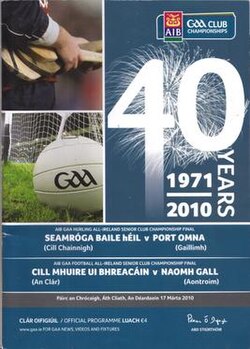2009–10 All-Ireland Senior Club Hurling Championship
 |
|
| Championship Details | |
|---|---|
| Dates | 11 October 2009 – 17 March 2010 |
| Teams | 15 |
| All Ireland Champions | |
| Winners | Ballyhale Shamrocks (5th win) |
| Captain | Éamonn Walsh |
| Manager | Mick Fennelly |
| All Ireland Runners-up | |
| Runners-up | Portumna |
| Captain | Leo Smith |
| Manager | Johnny Kelly |
| Provincial Champions | |
| Munster | Newtownshandrum |
| Leinster | Ballyhale Shamrocks |
| Ulster | Dunloy |
| Connacht | Portumna |
| Championship Statistics | |
| Matches Played | 14 |
| Total Goals | 33 (2.35 per game) |
| Total Points | 428 (30.57 per game) |
| Top Scorer | Henry Shefflin (1–42) |
|
← 2008–09
2010–11 →
|
|
The 2009–10 All-Ireland Senior Club Hurling Championship was the 40th staging of Ireland's premier inter-county club hurling competition since its establishment by the Gaelic Athletic Association in 1970–71. A total of 15 teams competed in the championship, with Ballyhale Shamrocks unseating the two-time defending champions Portumna by 1–19 to 0–17 in the final at Croke Park, Dublin. The championship began on 11 October 2009 and concluded on 17 March 2010.
The build-up to the opening of the championship was dominated by Portumna and the possibility that they would become the first club to win three All-Ireland titles in-a-row, and a remarkable fourth in five championship seasons. Having secured their fifth county title since 2003, Portumna were only two games away from imoortality. The club had already come to be regarded as possibly the greatest club side of all-time. Winning an elusive three-in-a-row would close the argument on club hurling's greatest team.
Ballyhale Shamrocks were regarded as the primary challengers to Portumna's stranglehold on the championship. They entered the competition having captured their fourth county title and were hoping to become the first club to win five All-Ireland titles. Similarly, they were hoping to exact revenge on Portumna who dished out a 5–11 to 1–16 trouncing in the previous year's semi-final.
The 2009–10 club championship was run on a provincial basis as usual. It was a knockout tournament with pairings drawn at random in the respective provinces – there were no seeds.
Each match was played as a single leg. If a match was drawn there was a replay. If that match ended in a draw a period of extra time was played, however, if both sides were still level at the end of extra time another replay would take place.
...
Wikipedia
